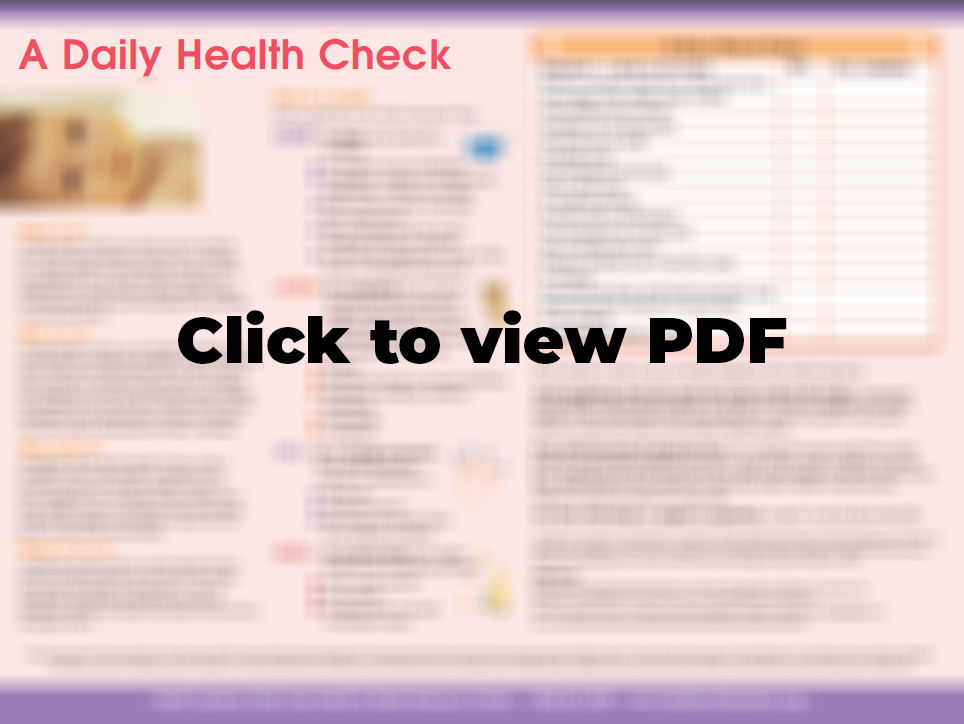3.7 Illness Management

Educators are responsible for ensuring the health and wellness of all children in a learning space. Educators and children are exposed to many pathogens given their close proximity to one another during care routines and when they are co-learning alongside one another. Educators must follow public health protocol and early years policies to maintain health and wellness in early years spaces. This may lead to challenging decision-making when a child must be excluded from care for symptoms of illness.
Families are unique and have different responsibilities and accountabilities. Some family members may face immense pressure in their workplace to avoid taking a day off. Some families do not have any family members or close friends living nearby. Families must be made aware of illness exclusion policies before enrolling in licensed child care to ensure they are able to adhere to the policies of the organization. Illness spreads very quickly in group care due to the close proximity of children and educators. Children discover and learn about their world through their senses, so young children often explore materials orally. While educators work quickly to disinfect shared materials, it is not always possible to prevent children from sharing items they have been exploring orally. Educators and child care supervisors work with families to support the health and wellness of all children. There may be times when a child is excluded from attending child care due to symptoms of illness or a diagnosis from a doctor or nurse practitioner. This may present challenges for families who do not have backup support to care for a sick child. These situations will be discussed at further length below.
Regulation
Child Illness and Accident
36. (1) Every licensee shall ensure that a daily observation is made of each child receiving child care in each child care centre it operates and in each premises where it oversees the provision of home child care before the child begins to associate with other children in order to detect possible symptoms of ill health.
(2) Every licensee shall ensure that where a child receiving child care at a child care centre it operates or at a premises where it oversees the provision of home child care appears to be ill, the child is separated from other children and the symptoms of the illness noted in the child’s records.
(3) Where a child is separated from other children because of a suspected illness, the licensee shall ensure that,
- (a) a parent of the child takes the child home; or
- (b) where it is not possible for a parent of the child to take the child home or where it appears that the child requires immediate medical attention, the child is examined by a legally qualified medical practitioner or a nurse registered with the College of Nurses of Ontario.
(Ontario Regulation 137/15, under the Child Care and Early Years Act, 2014. © King’s Printer for Ontario, 2015)
Daily Health Checks
Educators in licensed child care conduct daily health checks to ensure children are not displaying any symptoms of illness, to ensure they are feeling a sense of well-being, and to observe for any signs of trauma or abuse. Daily health checks should be conducted early in the day to support the child if any concerns arise. Daily health checks are usually conducted in a checklist format and may be part of the daily attendance records. A sample daily health check has been provided below. Any changes in behaviour or signs of trauma should be noted on the daily health check. Documentation provides a resource to review at a later date if tracking any concerns.

Scope of Practice
We will be discussing illness management policies in this chapter, so it is important to note that educators are not trained medical professionals. Educators are not equipped to diagnose children with symptoms of illness or with behavioural changes. Educators are equipped with knowledge of available resources in the community to share with families. Ongoing networking in the community and building interprofessional practice helps guide educators in knowing which supports are available and how to connect families with these supports.
Early years settings often have brochures, postcards with QR codes, guides, and lists of community resources. These resources can be shared with families through conversation or by displaying the resources in a high-traffic area, so family members may access the resources independently. Some families may be struggling with adversities and may not be ready to discuss these challenges with early years staff. It is important to continue to build relationships, resulting in more trust between educators and family members.
Illness Management Policies
Making the decision to exclude a child from an early years setting for symptoms of illness or for a specific medical diagnosis can be challenging. It is important that families understand the reason for the exclusion. Illness exclusion or sick policies should be included in the parent handback each family receives upon enrollment into an early years program. Educators and supervisors may want to discuss the illness policies during centre tours so families can determine whether the organization is the right fit for their family.
Fortunately, local public health units have infectious disease guides that support educators in the decision-making process when children are displaying symptoms of illness. Licensed child care organizations also develop policies in compliance with public health and the Ministry of Education. Page four of the following guide provides a quick reference chart for exclusion in group child care settings. This guide can be used to make decisions for children, educators, and employees of early years settings. This guide also provides information about different types of illnesses.
Recommendation
Ministry of Education Child Care Centre Licensing Manual – Recommendation
Each child care centre should obtain and post information (available from the local public health authority) on the symptoms, incubation periods and isolation periods of various diseases. Staff should be familiar with this information and pay close attention to any changes in children’s behaviour, daily routine or demeanour. Staff should pay particular attention to:
- elevated temperatures, flushing, pallor or listlessness;
- an acute cold, nasal discharge or coughing;
- vomiting or diarrhea; • red or discharging eyes or ears;
- undiagnosed skin rashes or infections; and
- unusual irritability, fussiness and restlessness.
Staff should be especially vigilant with younger children whose language skills are emerging and children with special needs, as such children may have difficulty communicating that they are not feeling well. Policies and procedures for the temporary care of moderately ill children may be developed by the licensee with assistance from the public health unit. Parents should be made aware of any policies that allow moderately ill children to participate in the program, particularly for licensed infant rooms, as young children are more susceptible to illness than older children.
Licensees should also develop policies and procedures related to when ill children will not be permitted to attend child care. These policies and procedures should be developed in consultation with the local public health unit and should include information on when parents will be notified of atypical behaviour or signs of ill health, as well as information on when parents will be asked to pick up their children. Staff should communicate with parents at the first sign of ill health, particularly with younger children (infants and toddlers) who have developed a fever, even if the threshold for asking that the child be taken home has not yet been met. Parents then have the choice to pick up their child if they are concerned. When a child has been exposed to a communicable disease such as measles (i.e., another child attending the centre is ill), licensees should notify parents as soon as possible and strongly encourage parents to contact their physician. Both staff and parents should observe all children who were exposed to the communicable disease for any signs and symptoms during the incubation period.
(Government of Ontario, 2023)
Read
Read the following about common childhood infections:
- A Guide to Common Childhood Infections from Middlesex-London Health Unit & Southwestern Public Health

